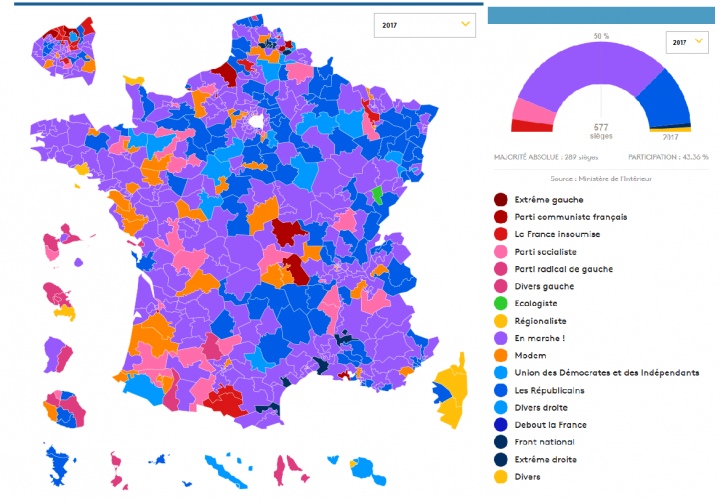The second round of the French legislative elections seemed like a given. Everything indicated that Emmanuel Macron, the new president would obtain the backing of an overwhelming majority in parliament. 361 deputies out of 577 gives him a very large majority, although less than predicted.
This consolidates the neoliberal and reformist dimension of the leader of La République En Marche (TN: the Republic Forward, Onward, or On the Move), supported by an alliance with the Democrat Movement, a liberal social party with pro-European ideas, which contributed 42 of the 361 deputies to the Macron force. The Republicans, the classic right-wing party, won 126 seats, while Socialists and allies continued their decline with 46 deputies.
Apart from these three forces, France Insoumise and its ally the French Communist Party won 26 seats, from where they are expected to be able to fight against this definitive landing of financial power on French institutions. The National Front barely managed 8 deputies, showing a severe punishment of the xenophobic party that Marine Le Pen, who wasn’t a candidate in this round, could no longer camouflage. Another 10 seats were divided among small parties, including 3 for Corsican nationalists.
With these results we can conclude that the establishment has been consolidated with 533 deputies out of 577. The power of the bosses, the military-industrial complex and the Banking system will decide the fate of the French people and will face each other to see who can get their hands on the largest slice of the cake.
But is everything bad in these elections?
No, of course not. To start with, on July 4th when the new configuration of Parliament begins, there will be no fewer than 219 women, which is an absolute record and well beyond the 155 in the 2012 distribution that represented 27%.
France Insoumise brings some new blood into the Chamber with its 16 deputies, candidates who do not come from a political background and who fought on one of the best electoral programs in French history. They are joined by the 10 seats of the French Communist Party with whom they will form an opposition bloc and engage in permanent denunciation. They will be the voice of their districts and the struggles of minorities.
Among them stand out Jean-Luc Mélenchon, the candidate for president who will return to the legislative work; Caroline Fiat, the nursing assistant who defeated the candidate of the National Front in Lorraine; Michel Larive, winner in Arliège, president of the festival of theatre in Couserans and co-founder of the Agency of Development of Cultural Economy in the same region; also the alternative, feminist and antiracist Danièle Obono, who managed to win in one of the districts of Paris and was spokesperson for France Insoumise.
Participation in the election barely exceeded 35%, a percentage to which must be added blank and null votes, showing a very low participation of citizens. While it seems that President François Hollande’s party was severely punished, we shouldn’t fail to mention that many of Macron’s new deputies were former Hollande’s supporters. Cross-dressing has been the order of the day for the arrival to power of the ex-Rothschild banker.
Translated from Spanish by Silvia Swinden






